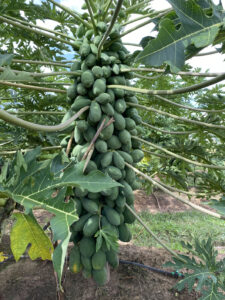
Red Papaya: The Little-known Super Food
By Dr Josekutty
Red papaya is a delicious fruit, rich in vitamins, minerals, antioxidants, with low calories and low-medium glycaemic index, making it an excellent Super Food.
Papaya (Carica papaya) is a little-known Super Food. Australian Papaya: 2020 Nutrition Review has detailed the great nutritional potential of papaya. The delicious pulp of Skybury Red Papaya is a cocktail of vitamins, minerals and antioxidants. It has more Vitamin C than an orange and more potassium than a banana but has low-medium glycaemic index making it an ideal diet food. I consumed papaya as the sole fruit on a Phatt weight loss program (6-week cycle) and lost 11kg compared to my partner in the diet program who lost only 5.5kg in the same diet cycle, although she consumed a variety of expensive berries, green apples etc. as the recommended fruits!
Papaya is the third most produced tropical fruit in the world1. In Australia, much of the papaya production is in tropical Queensland with limited production in the Northern Territory and tropical Western Australia. Skybury farms in Queensland is a diversified agribusiness with over 60% market share of papaya in Australia. It is a family business established by Ian and Marion MacLaughlin as Skybury Coffee in 1987. Skybury coffee is the oldest Australian commercial coffee plantation and now the largest papaya farm in Australia. Apart from Papaya and Coffee, Skybury also has small scale production of citrus, avocado, banana and passion fruit. Skybury recently achieved high average production of ≥100 t/ha papaya as a result of its continuous investment into research and development for about a decade.
A recent review by Spritzler2 on evidence-based health benefits of papaya listed its significance to eight common health conditions including cancer, heart diseases and diabetes. Papaya is treated as a medicinal fruit in India because of its many medicinal uses in the 2500-year-old traditional Indian medicine, Ayurveda.3 There have been many scholarly publications on papaya recently due to the nutraceutical and pharmaceutical significance of it.4,5 A recent review (Kong et al. 2021)6 has highlighted the potential applications of papaya against various conditions, including cancer, inflammation, aging, healing of the skin, and other chronic diseases.
Poor genetic variability among cultivated papaya has been recognised as the bottleneck for papaya crop improvement through conventional breeding (Hansen, 2005)7. Papaya cloning technology perfected by Skybury eliminated challenges like sexuality and non-uniformity caused by seedling plantations. Development of a high-throughput somatic embryogenesis system for papaya enabled Skybury to make further rapid crop improvement through in vitro breeding. Principles of somatic cell genetics was applied in capturing genetic variability among the somatic cell populations in cell culture. Mutations followed by in vitro selection and rigorous, large-scale field trial allowed Skybury to realise Papaya Sticky Disease free (PSD free), delicious, very high yielding, papaya with high brix. The most advanced papaya line currently in production trial, ‘Skybury 35’, is named appropriately to commemorate the 35th anniversary of establishing Skybury farms in 1987.
References:
- Sekeli, R. et al. (2018). Malaysian Carica papaya L. var. Eksotika: Current Research Strategies Fronting Challenges. Front. Plant Sci. 9:1380. https://doi.org/10.3389/fpls.2018.01380
- Spritzler (2018). https://www.healthline.com/nutrition/8-proven-papaya-benefits
- Srivasthava, A.K. and V. K. Singh, (2018). Carica Papaya- A Herbal Medicine. International Journal of Research Studies in Biosciences. 4 (11), 19-25. http://dx.doi.org/10.20431/2349-0365.0411004
- Santana, L.F., et al (2019). Nutraceutical Potential of Carica papaya in Metabolic Syndrome. Nutrients, 2019, 11, 1608. https://doi.org/10.3390/nu11071608
- Saeed, F., et al. (2021). Nutritional and Phyto-Therapeutic Potential of Papaya (Carica Papaya Linn.): An Overview. International Journal of Food Properties, 17:7, 1637-1653. https://doi.org/10.1080/10942912.2012.709210
- Kong, Y.R., et al. (2021). Beneficial Role of Carica papaya Extracts and Phytochemicals on Oxidative Stress and Related Diseases: A Mini Review. Biology 2021, 10, 287. https:// doi.org/10.3390/biology10040287
- Hansen, V. (2005). Final report papaya breeding and variety development. https://www.horticulture.com.au/globalassets/hort-innovation/historic-reports/papaya-breeding-and-variety-development-fr99018.pdf.
Puthiyaparambil Josekutty, MSc., PhD.
Research Manager, Skybury farms
+61 478 793 110
Main photo: The 400 fruiter “Skybury 35” – New Skybury Papaya that is sweeter and more flavoursome. This line may yield ≥ 400 fruits in the crop cycle
